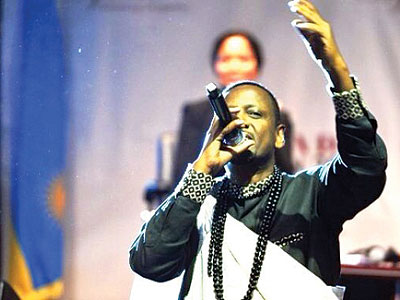ALL ENTERTAINMENT related activities will be put on hold, for a week, beginning today as Rwanda remembers the victims of the 1994 Genocide against the Tutsi.


ALL ENTERTAINMENT related activities will be put on hold, for a week, beginning today as Rwanda remembers the victims of the 1994 Genocide against the Tutsi.
Primus Guma Guma Superstar Season 4 has already taken a break for the contestants to join the country in commemorating and honouring Genocide victims.
According to the organisers Bralirwa, the 10 artistes taking part in the music show will be involved in a number of activities in line with the Genocide commemoration week. They will visit a memorial site and also engage in charitable activities aimed at supporting Genocide survivors.
Elsewhere, different musicians were taking part in rehearsals ahead of today’s Genocide anniversary main event at the Amahoro National Stadium in Remera, Kigali.
They included Maria Yohana, Diplomate, Jean-Paul Samputu and Intore Masamba. Every year, with the support from the National Commission for the Fight against Genocide (CNLG), several artistes come up with a theme song for Genocide commemoration, which is normally unveiled during the main event – on April 7.
Also to be shown at the stadium will be a play depicting the country’s journey over last 20 years. The play, which will feature different actors, includes orphans of Agahozo Shalom Youth Village in Rwamagana.
Several artistes have also planned separate activities. 2013 PGGSS winner Riderman, for example, has organised a walk to remember with his fan club.
A couple of artistes have also released Genocide commemoration songs. They include Eric Senderi who released his song last week (both audio and video), and Diana Teta, who will release her song ‘Ndaje Rwanda’ today at the stadium.
Stars pay tribute
Meanwhile, several international artistes and actors were expected in Rwanda to take part in Genocide commemoration events as the country remembers a million of its people who perished in 100 days of the Genocide. They included Alicia Keys, who reportedly arrived in the country over the weekend. Many more international stars sent recorded messages of solidarity which will be relayed during the week.
Nigeria’s musician Femi Kuti is among those who have sent messages of solidarity reportedly through the Rwandan High Commission in Nigeria. Kuti was last in Rwanda in 2012.
Canada-based Rwandan singer Corneille Nyungura paid tribute to Rwandans for their recovery process over the past two decades.
Corneille said that even though he could not make it to Rwanda to join his countrymen for the commemoration, he will "morally and spiritually” participate in commemorating the Genocide against the Tutsi.
"20 years have passed and we have coped and overcome. We are a strong people, a resilient people, a beautiful people,” the singer said on his Twitter account.
Musicians killed in the Genocide
During the Genocide commemoration period, artistes are expected to honour musicians who were killed during the Genocide. Over a dozen musicians were killed.
The Association of Rwandan Musicians (LIRAM) says that at least 14 prominent musicians were killed during the Genocide but that the total number could be much higher if one was to include ‘underground’ musicians.
Among those who were killed is André Sebanani, who was the front man of Orchestre Impala. He is particularly remembered for his famous hits such as Mama Munyana, Urabaruta, among others.
Others include, Sadi Gatete, who was a member of Orchestre Abamararungu; Loti Bizimana, from Orchestre Ikibatsi, Eugène Rugerinyange, of Orchestre Ingeli, Mimir Murebwayire, one of the very few female musicians at the time and a member of Orchestre Les Citadins, and Emmanuel Sekimonyo, famously known as ‘Manu Tabaro’.
Cyprien Rugamba, one of Rwanda’s most eulogised artistes who was the leader of Amasimbi n’Amakombe, is among the most prominent Genocide victims. He was killed in April 1994.
Saulve Iyamuremye, a member of Indahemuka Choir, Berchmans Rwakabayiza and Jean de Dieu Kayigamba, both members of Chorale de Kigali, and Bernard Kalisa of Chorale Ijuru, are among the other victims.
Other prominent solo artistes killed during the Genocide include Rodrigue Karemera, remembered for songs such as Urwibutso rw’Umutoni and Ndakwibuka, as well as the musical couple of Agnes Uwimbabazi and Dieudonné Bizimungu.


